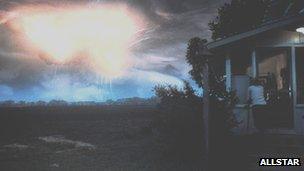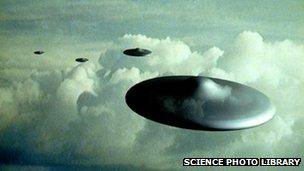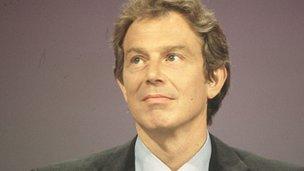What was it really like working on UK's 'X-Files' ?
- Published

Bright lights in the sky? Think paperwork and FOI requests, not alien visitations
Files released by the National Archives reveal for the first time detail of the role of UFO Desk officers, what they really thought about the possibility of alien visits, and their briefings to Tony Blair on UFO policy.
Between 1950 and 2009 a special Ministry of Defence unit investigated more than 10,000 UFO "sightings" - a rate of one every two days.
Most, it appears from papers released on Thursday, had an everyday explanation, from aircraft, to balloons, reflected lights or other innocent activity.
One of the newly-released papers, from December 2008, shortly before the desk was transferred to the RAF's Air Command, indicates what life was like for those posted to UFO duties.
Deal with UFO reports
"In the event I win the lottery over Christmas or walk under a bus, I thought it would be helpful if I gave you some details about the role of the UFO desk beyond the daily mechanics of the job," an investigator cheerfully wrote in an email.
Sanchia Berg has been looking at files released by the MoD on UFO sightings
The UFO Desk conjures up images of a murky world of unmarked helicopters, blacked-out SUVs, Men In Black operatives and a procession of strange lights in the skies.
The reality, as revealed by the ninth tranche of declassified National Archives documents, is definitely more Yes, Minister than Mulder and Scully.
When it was announced in 2007 that papers relating to the desk were to be released to the public, some newspapers went into overdrive.
"MoD to open British UFO X-Files", declared the Daily Telegraph.
When they were actually released in 2008 the <link> <firstCreated>2008-05-14T00:31:43+00:00</firstCreated> <lastUpdated>2008-05-14T00:31:42+00:00</lastUpdated> <caption>BBC News website reported "Files released on UFO sightings"</caption> <url href="http://news.bbc.co.uk/1/hi/uk/7398108.stm" platform="highweb"/> <url href="http://news.bbc.co.uk/1/mobile/uk/7398108.stm" platform="enhancedmobile"/> </link> although the Daily Star went with the more dramatic "Brit X-Files open at last".
The desk was closed because the £50,000-a-year budget was diverting "MoD resources from tasks that are relevant to defence".
The vast majority of the desk's work was dealing with UFO reports, the majority of which came via a hotline, where members of the public could leave details of what they had seen.
"People often see things in the sky they cannot explain," he said. "Sometimes, as concerned citizens, they report them to us since they believe we will be able to identify what they have seen."
The latest papers show examples of the kind of sightings reported. In 1977, for instance, a spate of UFO sightings in west Wales led to local MP Nicholas Edwards becoming "inundated" with reports and asking the MoD to investigate.
A local hotel owner said a dome-like object landed "like the moon falling down" behind the hotel - she saw two tall silver-suited "faceless humanoids" come out of the object and start "making measurements".
An RAF police officer was called in to interview the woman and suspected a silver protective suit seen in a shop window in nearby Haverfordwest might have been just too tempting for a local practical joker.
Investigate the unexplained
"From time to time, we may receive a report from aircrew, air traffic control or the police that, in our judgement, may deserve a closer look since they are either trained observers or are sufficiently well-versed in aviation matters for their reports to carry more weight and detail than usual," the email said.
The desk would then have to liaise with experts and attempt to provide a rational explanation.

Is it a bird? A plane? A secret Soviet weapon?
One example - which at the time prompted a letter to defence officials over why RAF fighters had not been scrambled - took place in 1996.
Police officers in Skegness and Boston in Lincolnshire spotted a UFO, according to MP Martin Redmond, and that something had also had been picked up by RAF radar.
An investigation carried out by an RAF wing commander said the Royal Greenwich Observatory had identified the lights spotted by the police as particularly bright stars.
Those radar signatures? Apparently an echo from the spire of Boston's St Botolph's Church.
By the end of the unit's life, about 5% of cases investigated remained unexplained.
Brief parliament - and the public
A lengthy briefing was given to Prime Minister Tony Blair in 1998, just as the incoming Labour government was implementing the White Paper on Freedom of Information (FoI).
Nick Redfern, author of a book on the UK government's UFO files, had urged the new PM "to consider making available for public scrutiny all of the many and varied UFO reports compiled by the government".

Tony Blair was briefed on the UK's UFO files
In an earlier briefing document for a House of Lords debate on UFOs, a previous incumbent was moved almost to poetry, questioning why aliens would want to come to "an insignificant planet (the Earth) of an uninteresting star (the Sun)".
The intelligence officer recovered from this philosophical conundrum to conclude that "claims of thousands of visits in the last decade or so are far too large to be credible".
The officer in 2008 said he expected to receive at least 100 FoI requests each year.
'Google the internet'
Some conspiracy theorists believed the fact the MoD had a UFO desk meant there was much behind-the-scenes investigation of alien visits.
The intelligence officer's email rejects that idea: "[It] tends to suggest to the public that there are Top Secret teams of specialist scientists scurrying around the country in a real life version of the X-Files… [but] this is total fiction.
"The closest we have to the post of 'UFO Expert' is probably my own, but this has always been a generalist, non-technical post with the emphasis on correspondence with the public.
"Whilst I have naturally built up some degree of knowledge of various UFO cases as part of my tenure in this post, I often find the best source of information is simply to Google the internet!".